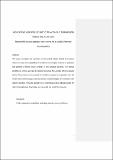Files in this item
Beyond the security paradox : ten criteria for a socially informed security policy
Item metadata
| dc.contributor.author | Pavone, Vincenzo | |
| dc.contributor.author | Ball, Kirstie | |
| dc.contributor.author | Degli Esposti, Sara | |
| dc.contributor.author | Dibb, Sally | |
| dc.contributor.author | Santiago Gomez, Elvira | |
| dc.date.accessioned | 2017-04-19T15:30:13Z | |
| dc.date.available | 2017-04-19T15:30:13Z | |
| dc.date.issued | 2018-08-01 | |
| dc.identifier.citation | Pavone , V , Ball , K , Degli Esposti , S , Dibb , S & Santiago Gomez , E 2018 , ' Beyond the security paradox : ten criteria for a socially informed security policy ' , Public Understanding of Science , vol. 27 , no. 6 , pp. 638-654 . https://doi.org/10.1177/0963662517702321 | en |
| dc.identifier.issn | 0963-6625 | |
| dc.identifier.other | PURE: 249587573 | |
| dc.identifier.other | PURE UUID: d25712b0-45d2-4b99-93f8-caeeca2d911d | |
| dc.identifier.other | Scopus: 85050388458 | |
| dc.identifier.other | WOS: 000439360300001 | |
| dc.identifier.other | ORCID: /0000-0001-6936-7490/work/82179722 | |
| dc.identifier.uri | https://hdl.handle.net/10023/10630 | |
| dc.description | This article is based on a research that has been funded by the EU project “SurPriSe: Surveillance, Privacy and Security: A large scale participatory assessment of criteria and factors determining acceptability and acceptance of security technologies in Europe”, which received funding from the FP7 program, under the grant number: 285492. | en |
| dc.description.abstract | This article investigates the normative and procedural criteria adopted by European citizens to assess the acceptability of surveillance-oriented security technologies. It draws on qualitative data gathered at 12 citizen summits in nine European countries. The analysis identifies 10 criteria, generated by citizens themselves, for a socially informed security policy. These criteria not only reveal the conditions, purposes and operation rules that would make current European security policies and technologies more consistent with citizens’ priorities. They also cast light on an interesting paradox: although people feel safe in their daily lives, they believe security could, and should, be improved. | |
| dc.language.iso | eng | |
| dc.relation.ispartof | Public Understanding of Science | en |
| dc.rights | Copyright © 2017, SAGE Publications This work is made available online in accordance with the publisher’s policies. This is the author created, accepted version manuscript following peer review and may differ slightly from the final published version. The final published version of this work is available at https://doi.org/10.1177/0963662517702321 | en |
| dc.subject | Acceptability | en |
| dc.subject | Privacy | en |
| dc.subject | Public participation | en |
| dc.subject | Security | en |
| dc.subject | Technology | en |
| dc.subject | HM Sociology | en |
| dc.subject | T Technology (General) | en |
| dc.subject | Social Sciences(all) | en |
| dc.subject | NDAS | en |
| dc.subject | BDC | en |
| dc.subject.lcc | HM | en |
| dc.subject.lcc | T1 | en |
| dc.title | Beyond the security paradox : ten criteria for a socially informed security policy | en |
| dc.type | Journal article | en |
| dc.description.version | Postprint | en |
| dc.contributor.institution | University of St Andrews. School of Management | en |
| dc.identifier.doi | https://doi.org/10.1177/0963662517702321 | |
| dc.description.status | Peer reviewed | en |
This item appears in the following Collection(s)
Items in the St Andrews Research Repository are protected by copyright, with all rights reserved, unless otherwise indicated.

